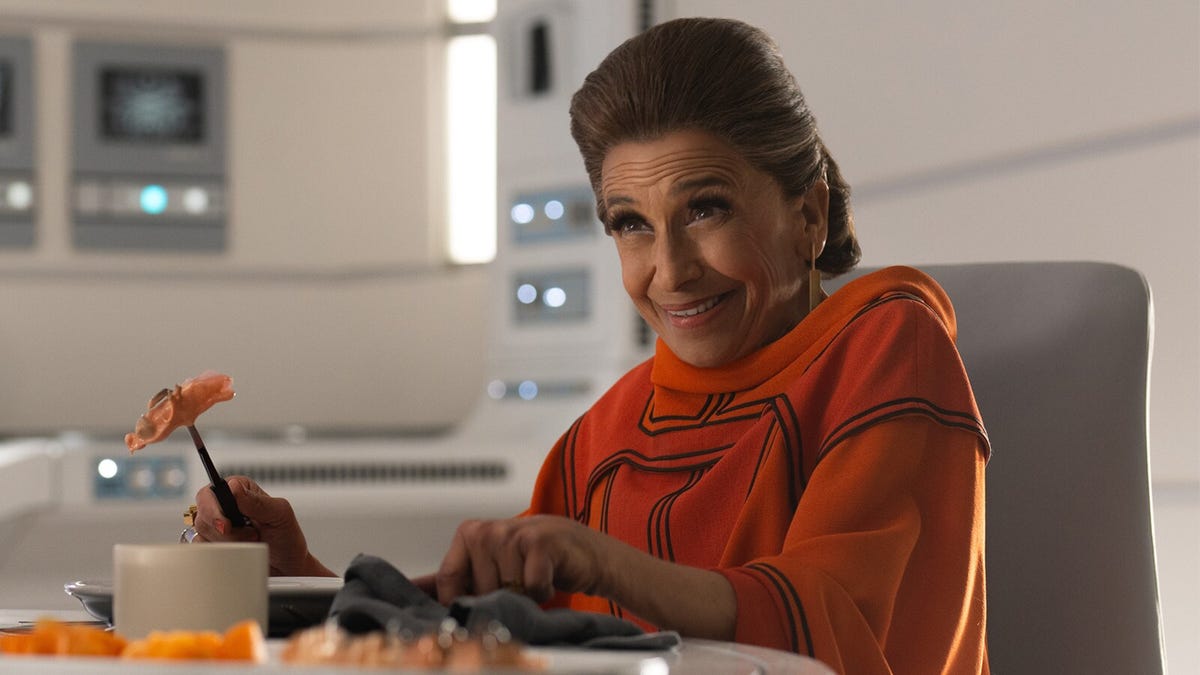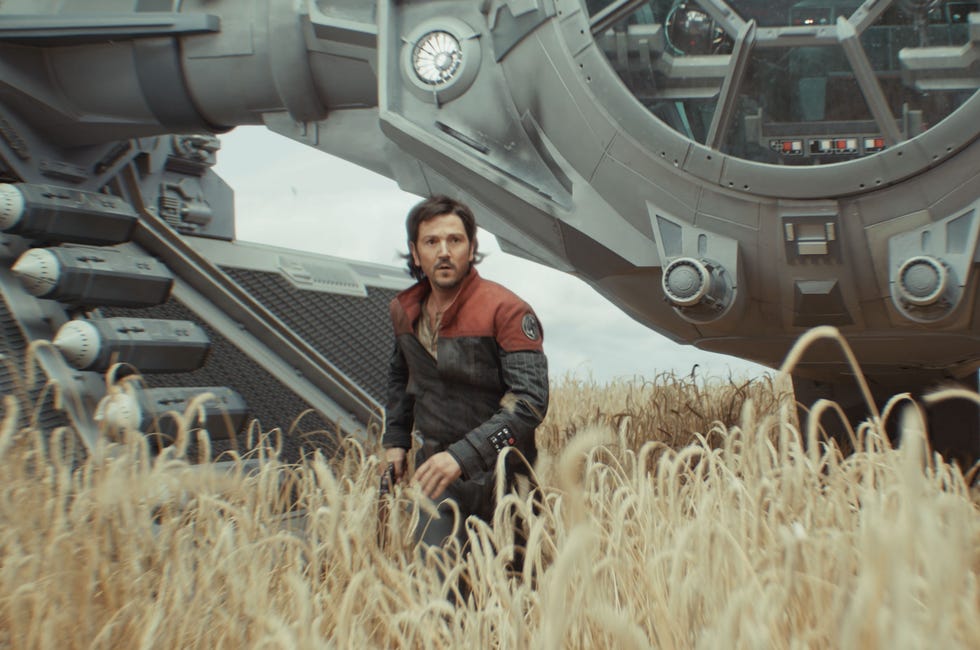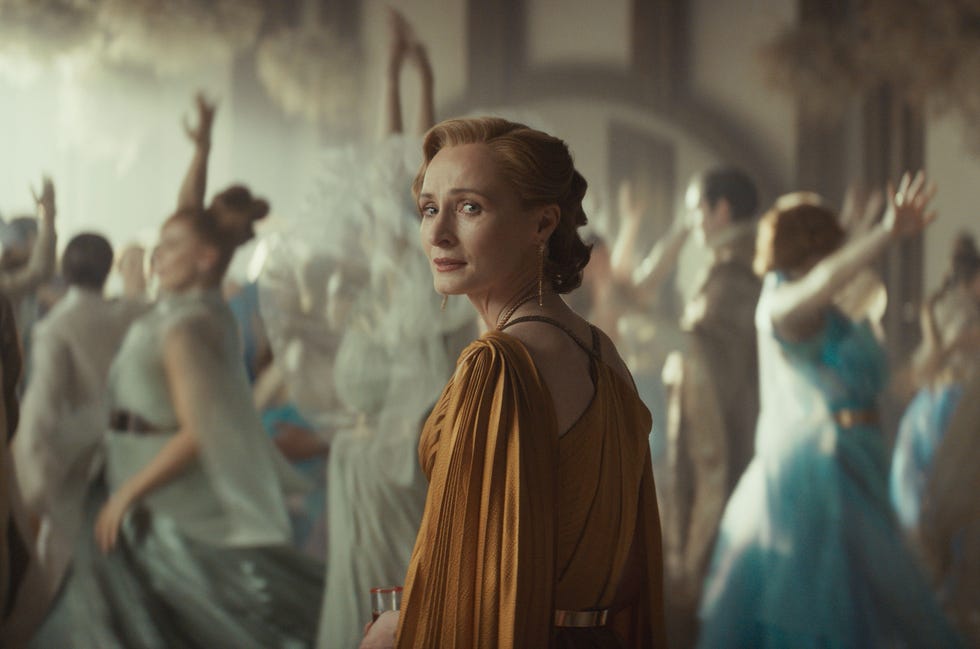<em>Andor</em> Season 2, Episode 3 Recap


Mothers know best. Or do they? In a franchise that began its story with gifted orphans and evolved into a saga about parental traumas, Star Wars exists in the streaming era as a tapestry that often meditates on the shortcomings of family. For Andor, this is made most apparent in season 2, episode 3, "Harvest." The final episode of Andor's three-episode premiere is a mixed bag of suspense, amusement, world-building cultural anthropology, and yet more frustrating plotting that so happens to spotlight a complicated archetype we're all familiar with: motherhood.
Altogether the funniest and darkest episode of Andor yet, two mothers of note take center stage while the show's titular hero, Cassian Andor (Diego Luna) reunites with Bix (Adria Arjona), but is still too late to save everyone. It's a bummer whenever Cassian isn't the main focus of his own show—and if we're being honest, it happens too regularly. But "Harvest" (again directed by Ariel Kleiman) is a notch above episode 2, ending on a heavy note of devastation, leaving audiences with their ears ringing.
Before we get there, put on your dancing shoes on and hit the floor. It's a Chandrilan wedding, baby! Go ahead and drink the dread away. Let's recap all that went down in Andor season 2, episode 3, "Harvest." Niamos!

Let's get the least important business out of the way: Cassian Andor. Fresh from his two days "upside down" (as he puts it in the episode), Cassian finally reunites with Bix and Wil (Muhannad Bhaier) on Mina-Rau. At the top of the episode, the TIE Interceptor's malfunctioning engines leaves the ship floating in space, putting Cassian in a situation that's just a tad reminiscent of Tony Stark at the beginning of Avengers: Endgame. But Cassian doesn't need an Uber pickup from Captain Marvel. Relying on his own know-how, Cassian gets his spacecraft moving, flying to meet up with his friends who've been laying low as undocumented farmers.
Though Cassian himself factors little in the episode, it's Bix and her crew who carry most of the show's dramatic heft. With Imperial auditing drawing Stormtroopers ever closer to them, Brasso (Joplin Sibtain) prepares to get Bix and Wil out to another post using fake documentation. But a maddening betrayal ends in a failed escape by Brasso, who dies just in time for Cassian to find his body.
Impossibly, Brasso's death isn't the only awful thing to happen to our heroes. Remember that wormy Imperial dipshit from episode 2? Well, he's a full-on rapist, as he once again corners Bix and actually attempts to assault her. (And I'll have to fact-check this, but this is the first-ever instance of rape I can recall in a piece of Star Wars visual media.) But Bix and her story of survival is one of Andor's strongest features—and series creator Tony Gilroy's delicate, uncompromising approach to telling it has been an astonishing thing to witness this season. The Empire is overwhelming and domineering, and the scars it's leaving on even the smallest people are everlasting.
In-Laws, Out of BoundsSyril (Kyle Soller) and Dedra (Denise Gough) continue to be the MVPs of Andor, with their unlikely love story smoothing out some of the rougher edges to this vast universe. For decades, we've been so preoccupied with Jedi and Sith and scum and villainy. But what about, like, normal people? What do their lives look like? This is a universe full of space witches and lightning bolt wizards, but people still chop veggies and clean dishes.
Dedra's top-level government job aside, these two are the most "normal" adults we've seen in Star Wars, second only to the sunlit suburban residents of Skeleton Crew. They're just like the New Yorkers I see on my daily commute. And I love watching them muck about their comically spotless apartment, rolling eyes at the whims of Syril's overbearing mother Eedy (Kathryn Hunter, who, by the way, is exceptional in The Tragedy of Macbeth). Hunter is so attuned in "Harvest," that I'm half-convinced she's ready to make a run at Darth Vader for the greatest Star Wars villain of all time. Her smoker's voice grows all the more grating as she berates her son over his mediocrity and fashioning self-pity like an accessory. This is exactly why it's easy to cheer for Dedra (Denise Gough, who may be Andor's greatest revelation), who weaponizes her iron exterior to put Eedy in her place. The whole thing feels like a lost Mad Men script that got picked up at Lucasfilm, and it's a refreshing counterbalance to the alien wedding rituals and fights for survival that encompass the rest of the episode.
Ultimately, Dedra's platonic victory over Eedy emphasizes the episode's underlying theme: Mothers will try their hardest to ensure the best-possible lives for their children, but just like fathers, they will fall short. This idea is deafening in the other motherly character of Andor, the show's de facto second main character.

I’m happy for Mon Mothma and her Call Me By Your Name-style dance moment.
Mon Mothma's daughter's days-long wedding celebration continues, now with the elaborate ceremony and subsequent dance party happening at last. (And what a ceremony it is!) It's intriguing to glean from all the breadcrumbs Mon Mothma (Genevieve O'Reilly) provides about her lore that she did not have the happiest upbringing, having her own difficult mother and personal emptiness in spite of her dignified surface. Now, she's more or less giving up her own daughter to marry into a shady family, all in the name of politicking. When Mon Mothma quietly encourages her daughter to cancel the wedding, she's desperately saving her last bit of humanity that's left. When her daughter refuses and insults her, the steely facade O'Reilly adopts is extraordinary. Suddenly, a mother and daughter have become strangers.
However confusing the entire Mon Mothma/Tay/Davo situation continues to be (they all seem to be allergic to speaking plainly), Ariel Kleiman's stellar direction again comes through as Mon Mothma's inability to find stable ground leaves her drunkenly (just like her own mother at her own wedding) hitting the dance floor, gyrating and spinning out of control before a hard cut to black before the credits. It's always welcome to see Star Wars be a little experimental; "Harvest" flashes genuinely good stuff that Star Wars can benefit from doing a little more—instead of ceaselessly riffing on Kurosawa.
Between Eedy and Mon Mothma, both preluded by Maarva in season 1, Andor has an interesting undercurrent of motherly trauma that is frankly refreshing, given the saga's abundance of daddy issues. This isn't at the heart of Andor, however, and I suspect these energies will go away by next week. But for now, Andor knows how much mothers can give it their all, and it still isn't enough.
esquire





